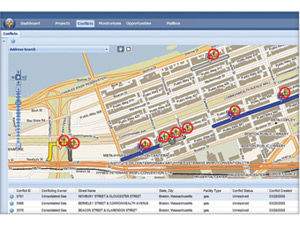The annual marathon in Baltimore is a tricky affair to coordinate among the city’s agencies, especially amid a full spate of construction and infrastructure projects. Conflicts between new construction and the race route are a key challenge for officials to manage. Enter Envista, a web-accessible infrastructure coordination software system that Baltimore’s chief of design and construction calls a game changer.

“Last year, we coordinated the Baltimore Marathon on Envista,” says Margaret Martin, chief of design and construction for the city’s department of general services. “This was the first year we didn’t have a complaint.”
The Beverly, Mass.-based Envista offers a map-driven product that helps different parties exchange and coordination construction and maintenance schedules. Municipalities, public and private utilities and highway agencies can overlay their construction data to create a holistic view of the status of city roads and highways. The firm claims its product keeps construction budgets on track while reducing the impact of street cuts.
One problem that sparked Martin’s quest for an improved coordinating system was the repeated repaving of roads by different utilities.
“First the water department would come through, tear up the road, do [its] installation repave, and then the gas company would do the same,” says Martin. “Coordinating transportation, water and gas projects is like choreographing three gorillas to dance,” says Martin.
Envista overlays on the same map the different departments’ projects, sends e-mail notifications when there is a conflict among projects and sets moratoriums on newly paved streets. Envista also reports when any department manager updates his or her schedule.
“If each department doesn’t keep the data up to date, it’s not credible,” admits Martin. However, as long as the data is entered into the system, the advantages are substantial. “You can literally save hundreds of thousands of dollars in paving costs,” she says.


Post a comment to this article
Report Abusive Comment